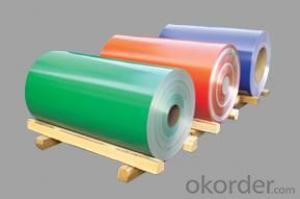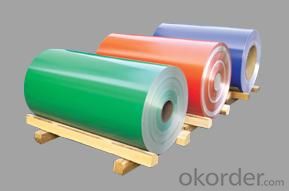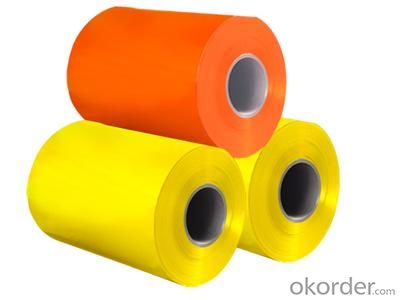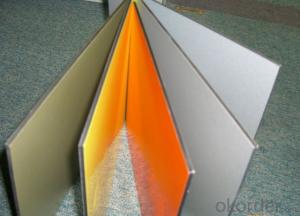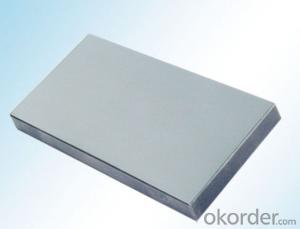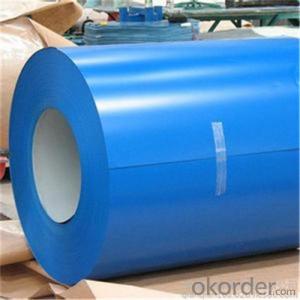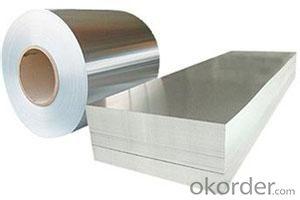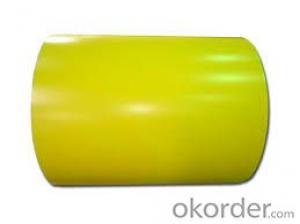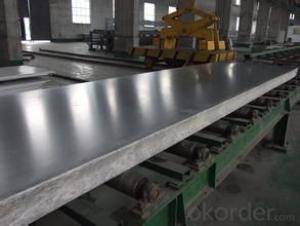Galvanized Aluminum Sheets - Prepainted Alu Sheet, Strip, Plate Hot Wholesale in China
- Loading Port:
- China Main Port
- Payment Terms:
- TT OR LC
- Min Order Qty:
- -
- Supply Capability:
- -
OKorder Service Pledge
OKorder Financial Service
You Might Also Like
Aluminium is a relatively soft,durable, lightweight, ductile and malleablemetal with appearance ranging from silvery to dull gray,depending on the surface roughness. It is nonmagnetic and does not easilyignite. A fresh film of aluminium serves as a good reflector (approximately92%) of visible light and an excellent reflector (as much as98%) of medium and far infrared radiation. The yield strength of pure aluminium is 7–11 MPa,while aluminium alloys have yield strengths ranging from200 MPa to 600 MPa. Aluminium has about one-third the density and stiffnessof steel. It iseasily machined,cast, drawn and extruded.
Alu Plate
Alloy: AA1050, 1060, 1100, AA3003, 3005, 3015, 5052, 5754, 5083,8011,etc
Temper:H14/16/18/22/24/32,HO etc.
Thickness:0.2mm—100mm
Width:100mm—2300mm (Can be slitted)
Application: Foil stock, Circles, Roofing, Canstock, Marine plate,Anti-sliperypurpose in vehicles, packing and appliance.
Features:
1. Excellent quality of products
2. Quick delivery
3. Best service to clients
4. BV,SGS avalible
5. No buckle o waveness
6. Tension leveling
7. Certificate of Origin
8. Form A,E
Packaging Detail: Carton ,Wooden pallet with plastic protection packing,standard seaworthy packing or as your request.
ProductionCapacity:
AnnualProduction capacity of 600,000 tons.
Products areexported to United States, Canada, U.A.E, Brazil, Mexico,Thailand, Vietnam,Nigeria etc, over 100 countries andregions all over the world.
Coveredfactories with full production line
CNBM aluminumproduction base is comprised of 18 aluminumannealers, 10 coil and foilmills, 4 continuous production lines, 2hot rolling production line and 3prepainted lines.
FAQ:
1. What is the form of payment?
Normally 30% TT, L/C
2. Type of quotation?
FOB, CFR, CIF
3. Port of loading?
Shanghai port
4. Delivery time?
30 day after client’s deposit
- Q: How does the thickness of aluminum sheet affect its formability?
- The thickness of an aluminum sheet has a significant impact on its formability. Generally, thinner sheets of aluminum are more malleable and easier to shape compared to thicker sheets. This is because thinner sheets have lower resistance to deformation and require less force to bend or stretch. Thicker aluminum sheets, on the other hand, have higher resistance to deformation and are less malleable. They require more force and energy to shape, and may be more prone to cracking or tearing during forming processes. Thicker sheets also have a higher likelihood of experiencing springback, where the material partially returns to its original shape after being formed. The formability of aluminum sheets is also influenced by the alloy composition and the specific forming process being used. In some cases, certain alloy compositions or heat treatments can enhance the formability of thicker sheets, making them easier to shape. In summary, the thickness of an aluminum sheet directly affects its formability. Thinner sheets are generally more malleable and easier to shape, while thicker sheets require more force and are less malleable. The alloy composition and specific forming processes being used can also impact the formability of aluminum sheets.
- Q: Can the aluminum sheets be used for manufacturing medical equipment?
- Yes, aluminum sheets can be used for manufacturing medical equipment. Aluminum is a versatile and lightweight metal that offers excellent strength and durability, making it suitable for various medical applications. It is commonly used in the production of surgical instruments, prosthetics, medical carts, and equipment housings due to its corrosion resistance and ease of sterilization.
- Q: Is it possible to utilize aluminum sheets in the interior design of vehicles?
- <p>Yes, aluminum sheets can be used for car interiors. They are lightweight, durable, and resistant to corrosion, making them suitable for various interior applications such as door panels, dashboards, and trim. Aluminum's malleability allows for easy shaping into complex designs, and it can be finished in various ways to match the aesthetic of the vehicle's interior. Additionally, its strength-to-weight ratio contributes to fuel efficiency and performance. However, it's important to consider the specific alloy and treatment of the aluminum to ensure it meets safety and comfort standards.</p>
- Q: Can aluminum sheets be anodized in different colors?
- Yes, aluminum sheets can be anodized in different colors. Anodizing is an electrochemical process that creates a protective oxide layer on the surface of aluminum, and this layer can be dyed to achieve various colors.
- Q: Is it possible to use aluminum sheets as a material for interior walls?
- <p>Yes, aluminum sheets can be used for interior walls. They are known for their durability, resistance to corrosion, and ease of maintenance. Aluminum sheets can also be painted or finished in various ways to match different interior design styles. They are lightweight, which makes them easy to install, and they provide good thermal insulation. However, it's important to consider the acoustic properties and the need for proper insulation to prevent condensation, especially in colder climates.</p>
- Q: Can aluminum sheet be used for chemical processing?
- Aluminum sheet is indeed applicable for chemical processing. Its versatility and resistance to corrosion make it a sought-after material in various industries, including chemical processing. The remarkable attribute of aluminum is its ability to withstand numerous chemicals, such as acids, alkalis, and salts. Therefore, it is well-suited for situations where exposure to corrosive substances is prevalent. Moreover, aluminum possesses the advantages of being lightweight, long-lasting, and possessing excellent thermal conductivity. These qualities make it a prime choice for facilitating heat transfer and promoting energy-efficient procedures in chemical industries. However, it is crucial to assess the specific chemical environment and seek guidance from experts to guarantee the compatibility of aluminum with the particular chemicals and conditions involved in the process.
- Q: Are aluminum sheets suitable for thermal insulation?
- No, aluminum sheets are not suitable for thermal insulation as they have high thermal conductivity, meaning they are not effective in preventing heat transfer.
- Q: This question asks about the various patterns that can be applied to aluminum sheets, which are commonly used in construction, manufacturing, and design.
- <p>Aluminum sheet patterns are diverse and cater to various applications. Some common types include diamond, checkered, embossed, perforated, and ribbed patterns. Diamond patterns offer a classic look and are slip-resistant, while checkered patterns are often used for flooring due to their traction. Embossed patterns provide a decorative touch and can enhance surface strength. Perforated patterns are used for ventilation, light filtration, and design purposes. Ribbed patterns, also known as corrugated, offer structural strength and are used in roofing and siding applications. Each pattern serves a specific function and aesthetic, making aluminum sheets versatile for many industries.</p>
- Q: What are the different types of alloys used in aluminum sheet?
- There are several different types of alloys used in aluminum sheet, including 3003, 5052, and 6061. Each alloy has different properties and is used for specific applications based on factors such as strength, corrosion resistance, and formability.
- Q: Is it possible for an individual to install their own aluminum sheet roofing?
- <p>Yes, you can install your own aluminum sheets roof, but it requires some skills and knowledge. You'll need to measure and cut the sheets accurately, secure them properly, and ensure watertight installation. It's advisable to have experience in roofing or construction, or to follow detailed instructions and safety precautions. For complex roofs or if you're unsure, hiring a professional is recommended to avoid damage or injury.</p>
Send your message to us
Galvanized Aluminum Sheets - Prepainted Alu Sheet, Strip, Plate Hot Wholesale in China
- Loading Port:
- China Main Port
- Payment Terms:
- TT OR LC
- Min Order Qty:
- -
- Supply Capability:
- -
OKorder Service Pledge
OKorder Financial Service
Similar products
Hot products
Hot Searches
Related keywords
